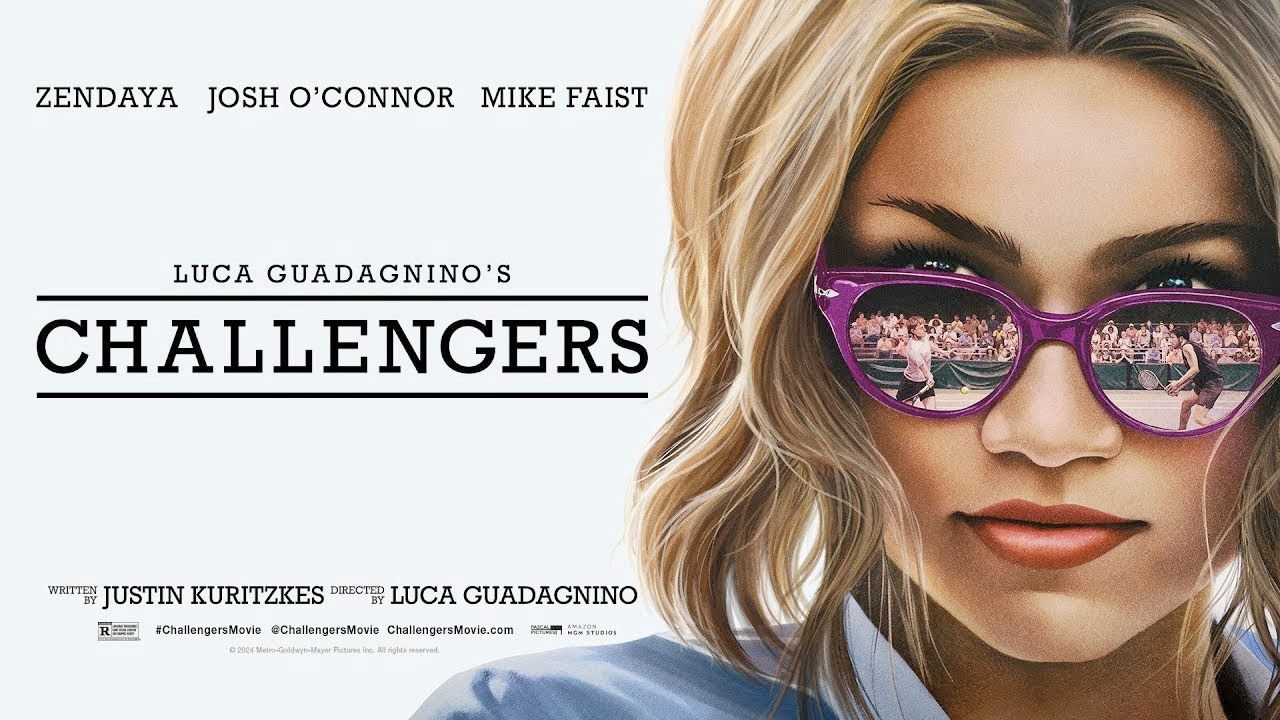Luca Guadagnino may not care for tennis but for Challengers, he uses the sport as a vehicle to explore desire, power, betrayal, jealousy and more. With a screenplay from Justin Kuritzkes and starring Zendaya, Josh O'Connor and Mike Faist as the love triangle battling on and off the court, Challengers hopes to serve up a game-changer of a film.
Art Donaldson (Faist) desperately needs to stage a comeback following a series of losses following an injury and loss of confidence, supported by Tashi Duncan (Zendaya), his wife, coach and former tennis prodigy. Opponent Patrick Zweig (O'Connor), his childhood best friend and his wife's former love interest, has his own reasons for seeking success in a rivalry bound to influence the game.
Luca Guadagnino has cemented a career for himself in exploring complex characters, wading into complicated thematic territory that many filmmakers would be swallowed whole by. Typically armed with knotty screenplays and surrounded by fearless creatives, Challengers is the latest in a long line (Call Me By Your Name, Bones & All) of miraculous orchestrations from Guadagnino: a breathtaking achievement that marks the continued ascent of an artist matching to the beat of his own drum.
Guadagnino's direction is some of the most thrillingly creative and breathlessly energetic in years. Matched with the visual prowess of cinematographer Sayombhu Mukdeeprom, the pair have conjured a propulsive, kinetic energy with Challengers that furiously throbs with an unshakeable, unfailing intensity from open to close. With so much of Challengers reliant on non-verbal communication, Guadagnino's clarity is vitally important to understanding the film's messages and intentions, but even so, it's remarkably impressive just how well-executed it is while circumventing the temptation to dumb it down, encouraging interpretation and refusing to spoon-feed its audience. With particularly inventive camera movements that capture the ferocity of the game - and more importantly, what the game represents - Guadagnino yet again proves himself to be one of the single greatest visionaries working today, and this is a treasure chest of spectacular tricks.
Of course, at the foundation of all this is Justin Kuritzkes' solid, sexy screenplay: one that lies a strong enough foundation for Guadagnino to bring his own indelible artistic merit. Challengers characters are sketched with depth and fascination, used to embody themes and ideas, while never becoming wholly defined by them, or too squarely intent on representing that they forget to be. Every conversation plays out like a game of tennis, with the opponents seeking to score points - but this never becomes a novelty, instead becoming increasingly thrilling as prizes come into focus with the stakes increasing. It plants seeds and watches them harvest, with one particularly exhilarating moment executed so gleefully that it's hard to wipe the smirk off your face for the rest of the film.
If Dune: Part 2 positioned Zendaya as a movie star, Challengers sends her into orbit, bringing her a mature lead character to deliciously sink her teeth into in a way she has not yet had the opportunity to do so before on the big screen. Delivering a tautly wound performance of a woman rattled with personal and professional frustrations, Zendaya examines the power that feeds into that cross-section, and how it is upheld with various contenders. While it may be a smartly considered turn, such calculation is never at the expense of an emotional current, which Zendaya conveys no better than during the titular challenger match we frequently return to throughout the nonlinear structure; an almost wordless showcase that hinges on reaction, and while Zendaya takes on the least active role during this match, it's her poise and influence over events that makes it so endlessly compelling, a work of total craftsmanship.
Faist and O'Connor are similarly well-matched adversaries, both providing exceptional leading turns that represent opposing notions of masculinity. While undoubtedly strong individually, so much of the film's success rests on their chemistry, one which obviously soars in shared scenes: the pair toy with whether their relationship is simply platonic or romantic to blistering effect, the subtleties of their work enhancing the film's subtext and providing richer meaning to themes of sexuality and desire, a sauna-set scene evidence of such. With Faist's vulnerability and O'Connor's bravado making for such entertaining viewing, the pair thrive while knowingly playing second fiddle to Zendaya's dominant control over them both. All in all, a trifecta of screen performances has not been this impressive in its understanding of their role and that of each other since Yorgos Lanthimos' The Favourite.
But there's another winning partnership in Challengers that absolutely deserves to be given the highest commendation: Trent Reznor and Atticus Ross' score is otherworldly, a techno-driven composition deployed smartly throughout the piece where it pulsates with an intensity that thrusts it to unbelievable heights. Rightfully, it won't leave my ears for the foreseeable future.
Throughout Challengers terrifically edited 132-minute runtime, boundaries are crossed, battle lines are drawn, and love and desire triangulate, culminating in a jaw-dropping final stretch that operates as a masterclass in creative filmmaking: its snappy pacing, innovative editing, exciting visuals and faultless performances are all utterly electrifying. At the helm, Luca Guadagnino registers another feature-length success as one of our most exciting, fearless filmmakers, surrounding himself with creatives driven by a shared desire to create something magical. Between the three intelligent powerhouse performers, Reznor and Ross, Mukdeeprom and the wider creative team, Guadagnino serves up a grand slam, an exhilarating experience that will be held up as an example of intelligent filmmaking brilliance for years to come. No faults found.
